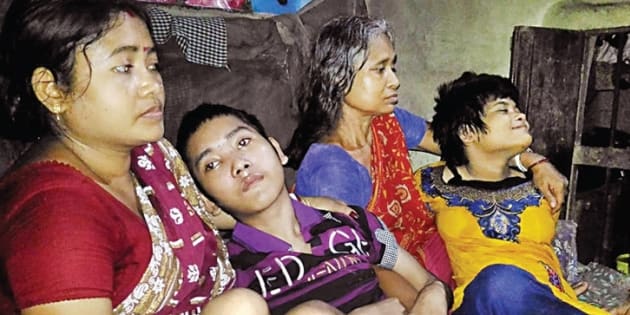Multiple rejections in one-track system
By CHANDREYEE GHOSE AND DEBRAJ MITRA
March 20 2017: Twenty-year-old Niharika (name changed) has just had her Aadhaar application rejected because of "unavoidable circumstances", the UIDAI's euphemistic explanation for a biometric scanner's failure to read the fingerprints of a person with cerebral palsy.
Niharika cannot straighten her fingers because of her condition, but she did try repeatedly at her mother's prodding. When a set of usable fingerprints could not be recorded, mother and daughter were told that there was no other alternative.
She is not the only one to be denied the unique 12-digit identity that is supposedly every citizen's right. Hundreds of Aadhaar applicants with disabilities have received rejection letters for no fault of theirs. Many have had to make multiple attempts to enrol for Aadhaar. Some are not even willing to try, fearing harassment during a process that seems to have bypassed the special requirements of anyone living with a disability.
According to the Calcutta-based Disability Activists' Forum, a large number of people with disabilities had tried and failed to enrol for Aadhaar because of a non-inclusive system and lack of sensitivity among enrolment agents. In most cases, the enrolment procedure cannot be completed because there is no alternative protocol for handling applicants with special needs. "I completed mine but the entire process is difficult for many," said Jeeja Ghosh of the Indian Institute of Cerebral Palsy.
The difficulties start with accessibility. Many of the enrolment centres are located on the upper floors of buildings without lifts and ramps. Even those on the ground floor do not have ramps and hence are off bounds not only for those in wheelchairs, but also senior citizens and anyone who cannot climb stairs.
Enrolment for Aadhaar is free but registration agents in the city often demand money for any special assistance. "It is not easy to take my daughter, who is a wheelchair user, to an enrolment centre for her second attempt. Even the first time was difficult. An agent promised to bring the scanner home but I am still waiting," said Suromitra Basu.
Scores of senior citizens do not have Aadhaar numbers yet because of the same reason. "The centre near my house requires climbing a flight of stairs, which my mother-in-law cannot. I have spoken to an agent about doing the enrolment at home but nobody has come yet," said Dipa Banerjee, principal and deputy director of services at Mentaid Special School.
Aadhaar operations in Bengal are under the jurisdiction of the UIDAI regional centre in Ranchi. A senior official at the Ranchi centre told Metro that enrolment should not be a challenge for anyone since Calcutta alone had around 500 enrolment centres across. "Several of these centres are on the ground floors of buildings and people who have problems in climbing stairs should visit those," he said.
The UIDAI website makes no mention of any centre with a lift or a ramp, though.
On whether a prospective applicant who is unable to step out of home can enrol for Aadhaar, the official said any person requiring this service could call the toll free number 1947. "The problem with publicising this helpline is that it could open the floodgates for requests for home enrolment of even candidates who are able to visit centres on their own."
Metro called 1947 with a request to send an agent home to help a disabled relative enrol for Aadhaar. It was turned down. "I am sorry, we cannot help you in this regard. You have to contact your local enrolment centre and make the request," said the woman who answered the call. "There is a provision to send agents home, but you have to make that request to your local centre."
Enrolment of children with special needs is also a challenge that the UIDAI has not been able to address. "Children with autism are usually hyperactive. It is very difficult for them to wait in queues. They also tend to have difficulty sitting still for the biometric screening process. Some close their eyes in fright when the iris is to be scanned," said Banerjee of Mentaid.
Many students at Mentaid have had similar problems. "Parents sometimes fail to get their wards to cooperate even after five hours of effort. An alien ambience often scares an autistic child," Banerjee said. "Hearing such horror tales, many parents refuse to try."
Annapurna Maruvada, a special educator at the Society for Visually Handicapped and the mother of a child with visual disabilities, has come across many children whose Aadhaar applications have been rejected. "Some parents are still at it and are ready to pay for every attempt, but it is still a tiresome process," she said.
Some students at the Indian Institute of Cerebral Palsy completed their Aadhaar enrolment after a sensitisation workshop was organised by Mohammed Asif Iqbal of the Welfare Society for the Blind. But many more have gone through several rounds of rejection.
"It is often difficult for the disabled to complete the biometric screening at one go. We tried to sensitise enrolment officers on assisting them. We also suggested that the disabled get many chances to complete the process," said Iqbal, who is visually disabled.
telegraphindia.com/states/west-bengal/aadhaar-agony-for-disabled/cid/1399213




